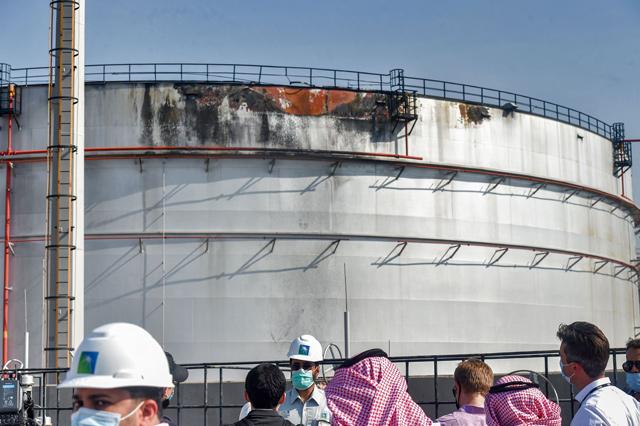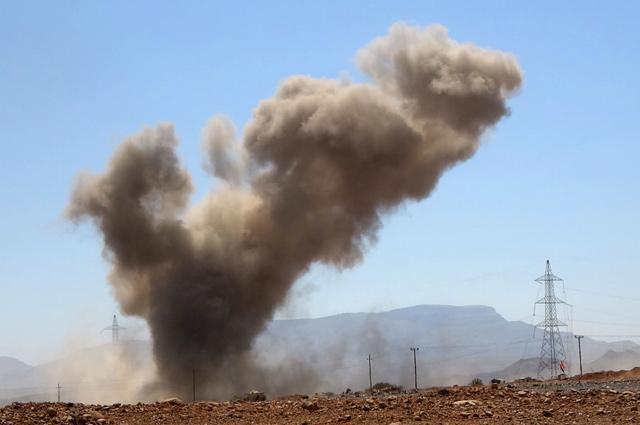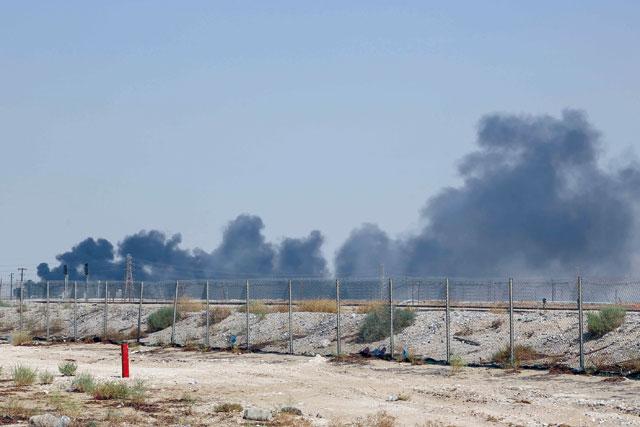You are here
Saudi Aramco says Houthi strike tore large hole in oil tank
By AFP - Nov 24,2020 - Last updated at Nov 24,2020

Journalists look at a damaged silo a day after an attack at the Saudi Aramco oil facility in Saudi Arabia’s Red Sea city of Jeddah, on Tuesday (AFP photo)
JEDDAH, Saudi Arabia — Saudi Aramco said on Tuesday that a strike by Yemeni rebels on its plant in Jeddah tore a hole in an oil tank, triggering an explosion and fire in another assault on the kingdom’s energy infrastructure.
The Iran-backed Houthi rebels said they struck the facility in the Red Sea city on Monday with a Quds-2 missile, as they step up attacks in retaliation for a five-year military campaign led by Saudi Arabia in Yemen.
The latest strike comes just over a year after aerial assaults on two other Aramco facilities temporarily knocked out half of the kingdom’s crude production.
Aramco granted foreign media access to the Jeddah distribution facility where damage to the storage tank was visible a day after the attack, with the top rim fire-blackened and a railings above buckled from the heat.
The roof of the tank suffered “major damage”, with a hole measuring two square metres, said Abdullah Al Ghamdi, manager of the North Jeddah Bulk Plant.
“It was a big fire; it was a big explosion,” Ghamdi said, adding the blaze was extinguished within 40 minutes and no casualties were reported.
The manager said distribution from the plant, which provides refined products including jet fuel to the country’s west, was restored within three hours even though the damaged tank — one of 13 — remained out of action.
Mangled and charred metal debris was put on display near the damaged tank, with company officials saying it would be forensically examined.
Aramco was still assessing the cost of the damage and it was unclear how long the repairs would take, Ghamdi said.
‘Hostile attack’
Saudi Arabia is stuck in a military conflict in Yemen, which has been locked in conflict since Houthi rebels took control of the capital Sanaa in 2014 and went on to seize much of the north.
A Saudi-led military coalition intervened the following year to support the internationally recognised government, but the conflict that has left tens of thousands of people dead has shown no signs of abating.
British Foreign Secretary Dominic Raab condemned the Jeddah attack, saying it contradicted the rebels’ claim that they were serious about ending the conflict.
“With Yemen at risk of famine, the Houthis must cease their aggression and work with the UN to achieve peace,” Raab wrote on Twitter.
Saudi Arabia has been targeted with dozens of ballistic missile and drone attacks since the start of last year.
Ghamdi likened Monday’s incident to the September 2019 assault on the Abqaiq processing plant and Khurais oil field in the kingdom’s east, which caused turmoil on global energy markets as it temporarily halved the kingdom’s crude output.
Houthi missiles and drones have mostly targeted Saudi Arabia’s southern provinces along their shared border, many of which the kingdom claims to have successfully intercepted.
But the attack on Jeddah, which lies some 600 kilometres from the frontier, is an indication of the rebels’ advancing arsenal.
The latest attack occurred as the United States deliberates tagging the rebels a “terrorist organisation”, a move that has drawn concern from humanitarian agencies who say it could cripple aid delivery and tip the country into famine.
The Houthis have reacted angrily to the prospect, saying President Donald Trump had no right to make the ruling after failing to win a second term.
However, his National Security Adviser Robert O’Brien said on Monday that the US was “keeping all our options open”.
Related Articles
DUBAI — Yemen’s Iran-backed Houthi rebels said they launched a missile that struck a Saudi Aramco oil distribution facility in the Red Sea c
ABQAIQ, Saudi Arabia — Saudi Arabia on Friday revealed extensive damage to key oil facilities following weekend aerial strikes that were bla
RIYADH — Drone attacks launched by Yemeni rebels sparked fires at two Saudi Aramco oil facilities on Saturday, in a new escalation that foll













